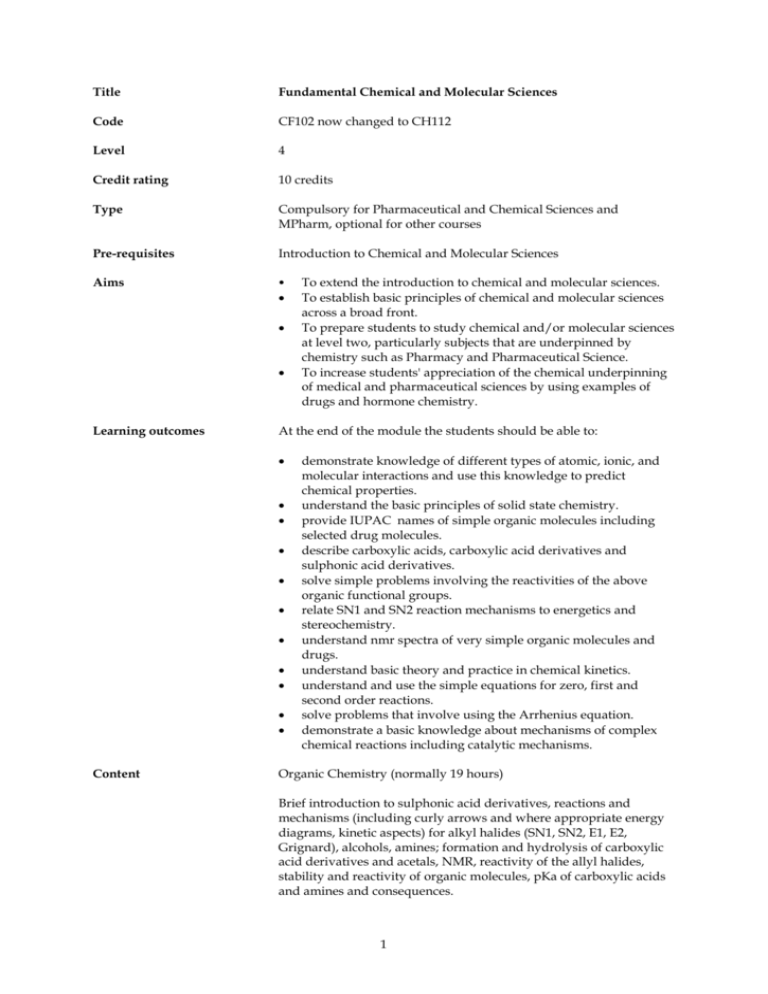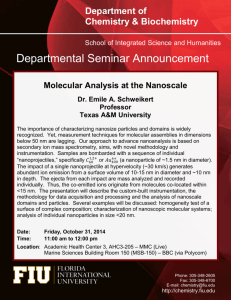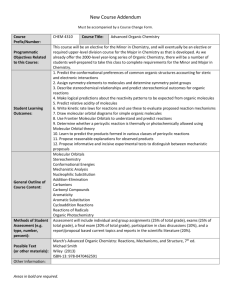Title
advertisement

Title Fundamental Chemical and Molecular Sciences Code CF102 now changed to CH112 Level 4 Credit rating 10 credits Type Compulsory for Pharmaceutical and Chemical Sciences and MPharm, optional for other courses Pre-requisites Introduction to Chemical and Molecular Sciences Aims Learning outcomes At the end of the module the students should be able to: Content To extend the introduction to chemical and molecular sciences. To establish basic principles of chemical and molecular sciences across a broad front. To prepare students to study chemical and/or molecular sciences at level two, particularly subjects that are underpinned by chemistry such as Pharmacy and Pharmaceutical Science. To increase students' appreciation of the chemical underpinning of medical and pharmaceutical sciences by using examples of drugs and hormone chemistry. demonstrate knowledge of different types of atomic, ionic, and molecular interactions and use this knowledge to predict chemical properties. understand the basic principles of solid state chemistry. provide IUPAC names of simple organic molecules including selected drug molecules. describe carboxylic acids, carboxylic acid derivatives and sulphonic acid derivatives. solve simple problems involving the reactivities of the above organic functional groups. relate SN1 and SN2 reaction mechanisms to energetics and stereochemistry. understand nmr spectra of very simple organic molecules and drugs. understand basic theory and practice in chemical kinetics. understand and use the simple equations for zero, first and second order reactions. solve problems that involve using the Arrhenius equation. demonstrate a basic knowledge about mechanisms of complex chemical reactions including catalytic mechanisms. Organic Chemistry (normally 19 hours) Brief introduction to sulphonic acid derivatives, reactions and mechanisms (including curly arrows and where appropriate energy diagrams, kinetic aspects) for alkyl halides (SN1, SN2, E1, E2, Grignard), alcohols, amines; formation and hydrolysis of carboxylic acid derivatives and acetals, NMR, reactivity of the allyl halides, stability and reactivity of organic molecules, pKa of carboxylic acids and amines and consequences. 1 Inorganic Chemistry (normally 9 hours) Atomic and molecular structure - wave mechanical model of the atom, description of atomic orbitals, molecular orbitals and bonding, solid state chemistry, packing, radius ratio, crystal lattices. Physical Chemistry (normally 11 hours) Introduction to formal chemical kinetics: reaction rates and calculus description; rate constants; rate expressions; molecularity and order of chemical reaction; mechanism of chemical reaction; rate determining step; kinetic and thermodynamic control; diffusion controlled processes; Arrhenius equation; experimental determination of activation energy and pre-exponential factor; consecutive and concurrent reactions. Examples of different mechanisms of complex chemical reactions: chain reactions; photochemical reactions; homogeneous catalysis; autocatalysis. Introduction to modern theory of chemical kinetics: collision theory; reaction co-ordinate, activated complex and transition state (theory of absolute reaction rates). Teaching and learning strategies 100 hours in total, comprising normally 38 hours contact time, 32 hours guided study and 30 hours independent study and assessment time. Learning support Organic Chemistry, Vollhardt and Schore, 3rd Edition, Freeman, 1999 Physical Chemistry, Atkins, 7th Edition, OUP, 2002 Inorganic Chemistry, Shriver and Atkins, 3rd Edition, OUP, 1999 Assessment One MCQ phase test (40%)and an end of module MCQ exam (60%) Brief description of module Completes the introduction to chemical and molecular sciences and provides sufficient depth to allow students to study chemistry and related molecular sciences such as pharmacy and biomedical sciences at level 2. Area Examination Board Chemistry Module authors Dr Peter Cragg Semester offered 2 Date of first approval 8 May 2002 Date of approval of this version 8 May 2002 Version number 1 Replacement for previous module CH109 and PY228 Courses for which module is acceptable Compulsory for PCS, MPharm Optional for other courses School home Pharmacy and Biomolecular Sciences External examiner Dr P Finch 2




